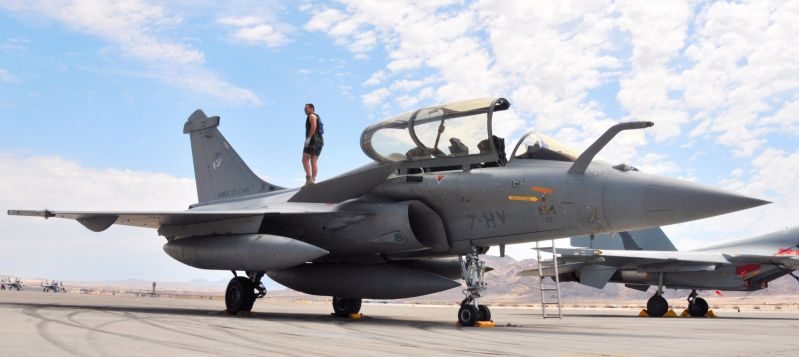France will about halve its purchases of Dassault Rafale jet fighter planes over the next six years, under defence estimates on Friday, and is counting on at last clinching the first sales abroad to keep production lines going.
French officials say that among potential clients are India, Qatar, Malaysia, the United Arab Emirates and Brazil.
The government, struggling to curb public spending, also made clear that there will be no change to the French independent nuclear deterrent which successive governments have treated as a vital issue of national defence.
Dassault Aviation, which builds the Rafale fighters, used to high-profile effect in fighting in Libya and Mali, was to supply 11 planes a year to the French defence forces.
This was intended to ensure an essential minimum amount of work for production lines while France tries to achieve the first sales of the aircraft abroad.
But the government, which is struggling to meet commitments to the European Union and to retain investor confidence by getting its public deficit under control, is crimping public expenditure including spending on defence.
Under the draft defence estimates put before the cabinet on Friday, the left-wing government will acquire only 26 of the planes during the next six years.
Defence Minister Jean-Yves Le Drian had said on June 11, that from 2016 Dassault Aviation would have to count on exports to underpin production of the plane which is able to fulfill several types of mission.
On Friday, the minister said on Europe 1 radio: “There are countries which today are really interested in buying the Rafale, I am thinking particularly of India, Qatar, of other countries, and I am very confident of the chances of exporting the Rafale in coming months.”
France has been in exclusive negotiations to sell 126 Rafale planes to India “and I have high hopes that this will be successful,” he said.
Sources close to the minister said that the estimates were based in part on a hypothesis that at least one country among other potential buyers would place an order before the end of 2019.
These countries are Malaysia, Qatar, the United Arab Emirates and Brazil.
An adviser to the minister said that the government was not changing its overall order for 180 Rafale planes, of which a total of 120 will have been delivered within the next few months, and it could place another slice of orders.
During the period covered by the estimates, Dassault would receive hundreds of millions of euros to design a pilotless combat drone by 2030 in cooperation with British aerospace group BAE Systems, and also to develop the Rafale to meet new standards, under a programme called F3-R.
The ministry’s objective is to underpin nine big defence industry activities, ranging from aerospace to communications and submarines. In order to achieve this, orders are being stretched out over time.
Le Drian, in separate remarks to broadcaster France 2, said that there would be no changes to the French nuclear deterrence capability.
The two components of the French independent deterrence, based on submarines and airborne, would be maintained.
‘Ultimate’ nuclear deterrence
“The President of the Republic (Francois Hollande) has decided to maintain the two components and they will be maintained,” he said.
The minister said that they were “indispensable because the second component (airborne) provides agility, the capacity for rapid reaction in a world where proliferation (of nuclear capability) is continuing and in which France must keep this ultimate security, this fundamental guarantee which is deterrence.”
The minister criticised the defence minister in the previous right-wing government, Herve Morin, for suggesting that one of the two components could be axed to save money.
However, Morin repeated his criticism in a statement on Friday, saying that the government was “fooling the defence forces and French people that France is still one of the four global military forces on the planet when in reality it no longer has the means, unfortunately.”
Last week Dassault Aviation reported a 20.0-percent fall in net profit for the first half of the year but held to its target for raising sales in the whole of 2013.
Net profit for the first half amounted to 165 million euros ($218 million). Sales fell by 5.0 percent from the equivalent figure last year to 1.82 billion euros.
Orders taken amounted to 1.41 billion euros, little changed from a figure of 1.42 billion euros in the first half of 2012.










